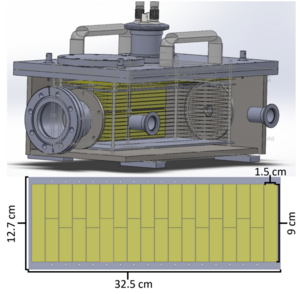ENCORE: Difference between revisions
Jump to navigation
Jump to search
No edit summary |
No edit summary |
||
| Line 1: | Line 1: | ||
[[File:3D model of Encore.png|thumb|right|3D model of Encore]] | [[File:3D model of Encore.png|thumb|right|3D model of Encore]] | ||
'''Encore''' <ref name="Encore2021">B. W. Asher, S. Almaraz-Calderon, L. T. Baby, N. Gerken, E. Lopez-Saavedra, A. B. Morelock, and J. F. Perello, Nucl. Inst. Meth. Phys. A '''1014''', 165724 (2021) https://doi.org/10.1016/j.nima.2021.165724</ref> is a Multi Sampling Ionization Chamber (MUSIC) developed based on the MUSIC detector at ANL, the main difference is using field cages instead of solid aluminum plates. Because of that, higher operation voltage is needed to optimize electron drift times. | '''Encore''' <ref name="Encore2021">B. W. Asher, S. Almaraz-Calderon, L. T. Baby, N. Gerken, E. Lopez-Saavedra, A. B. Morelock, and J. F. Perello, Nucl. Inst. Meth. Phys. A '''1014''', 165724 (2021) https://doi.org/10.1016/j.nima.2021.165724</ref> is a Multi Sampling Ionization Chamber (MUSIC) developed based on the MUSIC detector at ANL, the main difference is using field cages instead of solid aluminum plates. Because of that, higher operation voltage is needed to optimize electron drift times. It relies on a segmented anode to measure the beam energy loss through the detector. It also measures nuclear reactions strip by strip. The energy loss of the reaction products and the beam ionize electrons in the gas which drift upwards towards the anode, resulting in a signal. | ||
= Contact = | = Contact = | ||
* S. Almaraz-Calderon mailto:salmarazcalderon@fsu.edu | * S. Almaraz-Calderon mailto:salmarazcalderon@fsu.edu | ||
= References = | = References = | ||
Revision as of 21:57, 30 April 2025
Encore [1] is a Multi Sampling Ionization Chamber (MUSIC) developed based on the MUSIC detector at ANL, the main difference is using field cages instead of solid aluminum plates. Because of that, higher operation voltage is needed to optimize electron drift times. It relies on a segmented anode to measure the beam energy loss through the detector. It also measures nuclear reactions strip by strip. The energy loss of the reaction products and the beam ionize electrons in the gas which drift upwards towards the anode, resulting in a signal.
Contact
- S. Almaraz-Calderon mailto:salmarazcalderon@fsu.edu
References
- ↑ B. W. Asher, S. Almaraz-Calderon, L. T. Baby, N. Gerken, E. Lopez-Saavedra, A. B. Morelock, and J. F. Perello, Nucl. Inst. Meth. Phys. A 1014, 165724 (2021) https://doi.org/10.1016/j.nima.2021.165724
